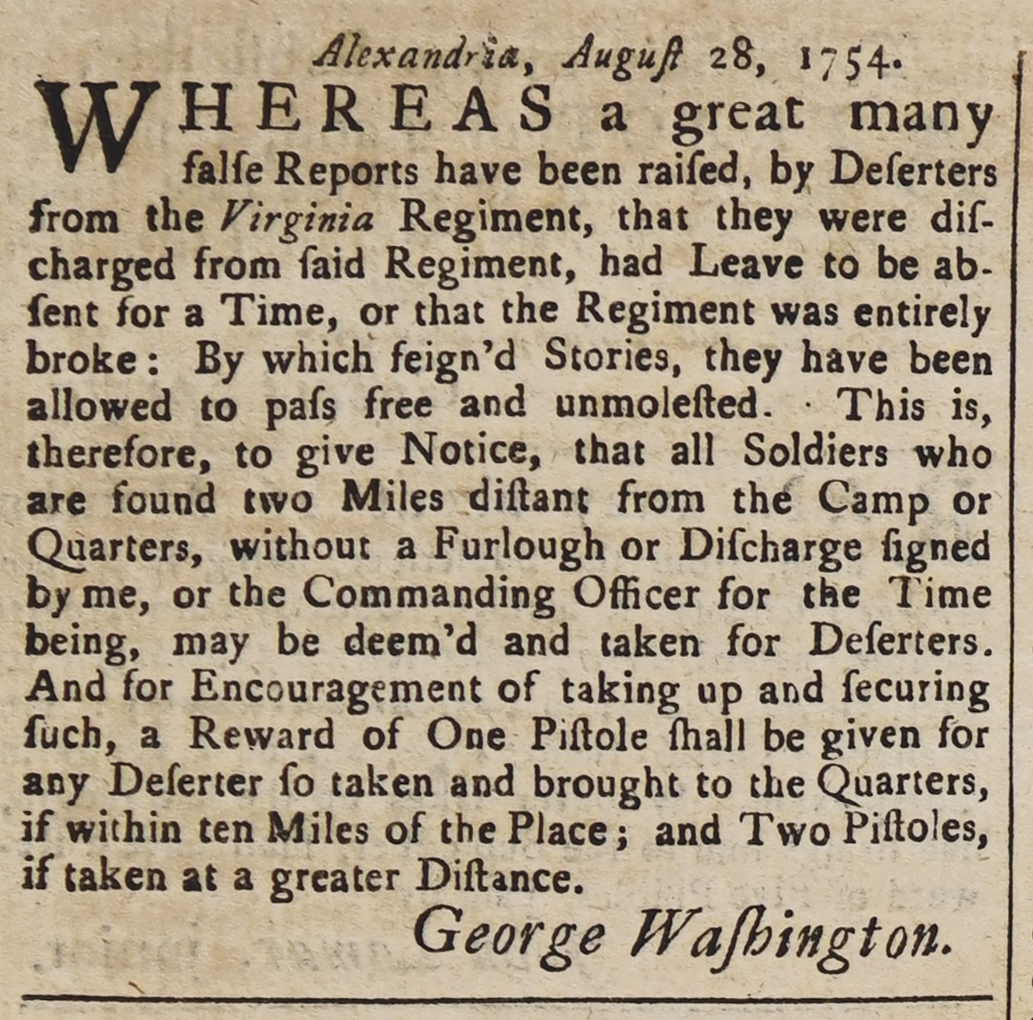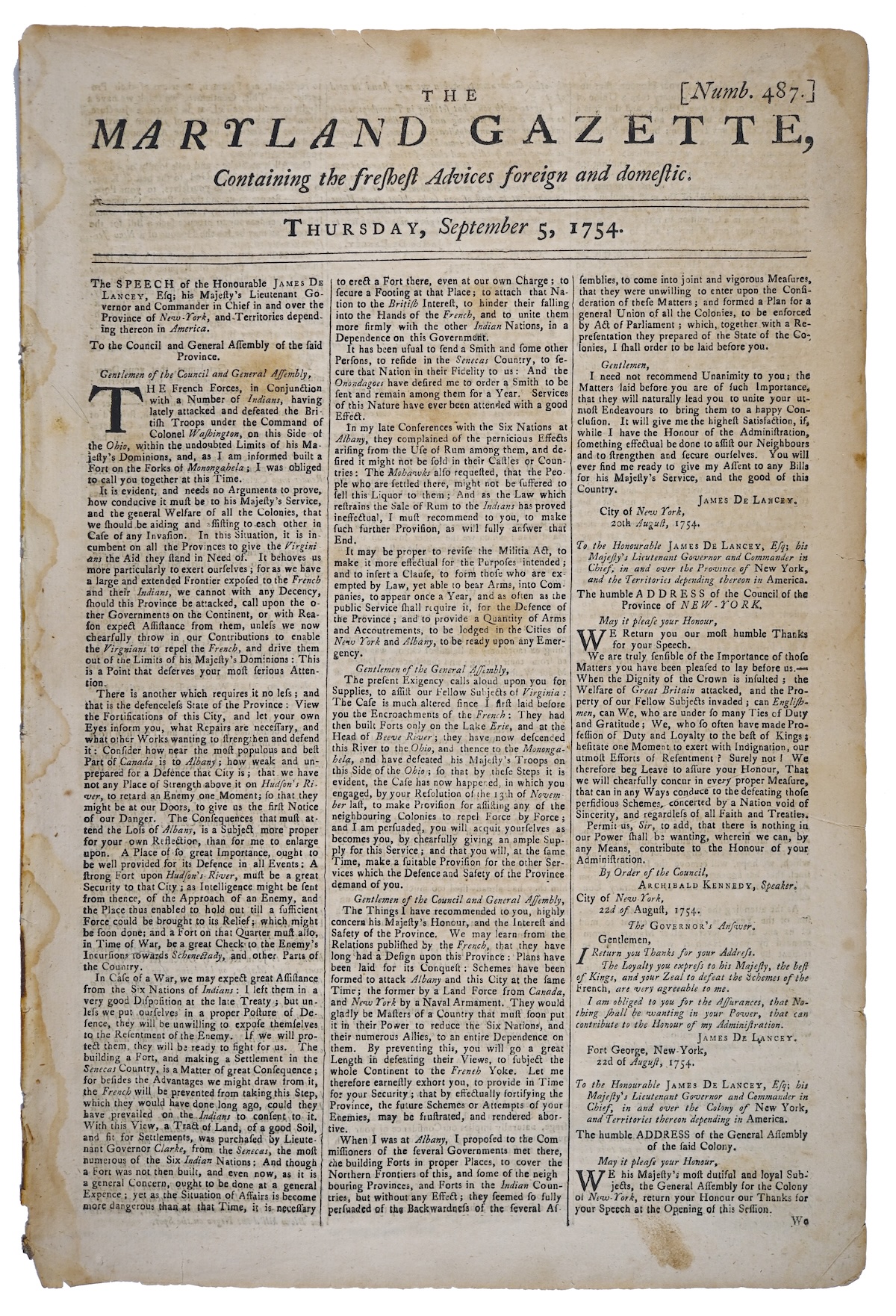George Washington at the dawn of his military career
WASHINGTON, GEORGE. “Whereas a great many false reports have been raised, by Deserters from the Virginia Regiment …” in The Maryland Gazette, 5 September 1754, p. 3
Annapolis: Jonas Green, 1754
Light wear and staining. Very good condition.
FIRST EDITION of George Washington’s second appearance in print. This rare document shows George Washington at the dawn of his military career, building the experience and reputation that would ultimately lead to his appointment as commander-in-chief of the Continental Army in the Revolutionary War.
In 1753 21-year-old Major George Washington was sent to the Ohio country by Virginia’s governor Robert Dinwiddie to demand that French forces vacate land claimed by the British. He returned with a letter by the French refusing to abandon their claims. Washington’s Journal (Williamsburg, 1754) recounts this expedition.
Washington, now a lieutenant colonel, was sent back to the Ohio in the spring of 1754 with 159 men to defend the British fort then under construction. When he arrived he learned that the French had captured it and renamed it Fort Duquesne, that they numbered more than 1000 men, and that most of the Indians in the region had decided to support them. Several military actions followed culminating in the Virginians’ famous surrender at Fort Necessity. These events marked the beginning of the French and Indian War. Despite questionable decisions and a convincing defeat, Washington returned to Virginia in July hailed as a brave leader who had made a gallant stand.
In this remarkable document, his second appearance in print (following the Journal), Washington attempts to maintain order in his regiment, recently returned from the Fort Necessity defeat. He observes that deserters were falsely claiming that they had been discharged or given leave—or even that the regiment had been disbanded. He therefore gives notice that “all Soldiers who are found two Miles distant from the Camp or Quarters, without a Furlough or Discharge signed by me, or the Commanding Officer of the Time being, may be deem’d and taken for Deserters.” He goes on to specify the terms for rewards offered for the return of the men. The announcement, headed “Alexandria, August 28, 1754,” is signed in full in print by Washington, then age twenty-two.
Washington was deeply concerned about the desertions, some of which he attributed to dissatisfaction due to delays in paying the officers and men, inadequate clothing, and the failure to receive expected commissions. In an August 20, 1754 letter to Dinwiddie, he addressed these issues and asked whether his troops were to be governed by laws regulating the militia or by those embodied in Britain’s Mutiny Act. One year later he and Dinwiddie finally convinced the Virginia Assembly to pass an act authorizing the death penalty for desertion.
The front page contains a long speech by New York Lieutenant Governor and commander-in-chief James De Lancey. Speaking to the Council and Assembly of New York, he begins by describing the recent events: “The French forces, in Conjunction with a Number of Indians, having lately attacked and defeated the British Troops under the Command of Colonel Washington, on this side of the Ohio, … I was obliged to call you together at this time.” De Lancey calls on the various provinces to work together to help the Virginians to defend against “the French and their Indians” and to “drive them out of the limits of his Majesty’s Dominions.” He lays out in detail his plans for cooperating with the Indians, building fortifications, and revising the militia act.
This rare document shows young Col. George Washington grappling with difficult problems as he develops the judgment and resolve that would help him lead the fledgling nation during the Revolutionary War and beyond.
RARE. We have located no copies of this rarity ever appearing for public sale. Only two other examples are extant (Library of Congress and Maryland State Archives).
$85,000




